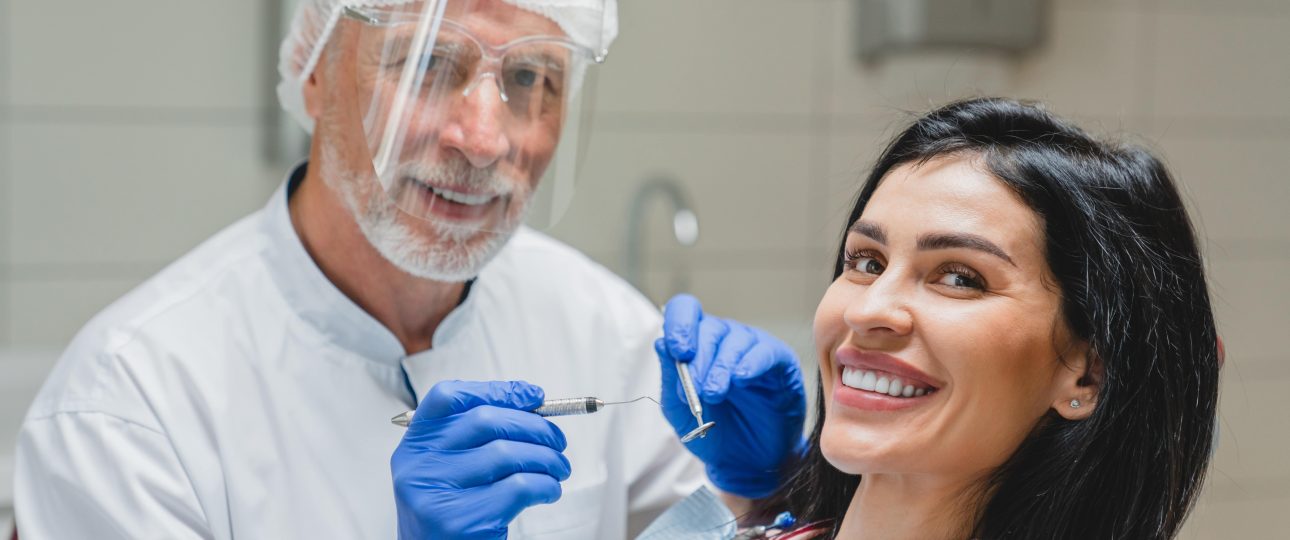The Dental Veneers are thin, tooth-colored shells that are fixed to the front surface of the teeth to enhance their appearance. Dental Veneers are often made out of porcelain or resin composites and are permanently bound to your teeth.
Dental Veneers can be used to treat a number of different aesthetic problems, including jagged, broken, discolored or smaller than average teeth.
Some people can obtain a single veneer in the case of a broken or chipped tooth,but many get between 6 to 8 veneers in order to create a symmetrical smile. The top front eight teeth are the most commonly applied veneers. You can learn more information about Dental Veneers by reading our content.
What Are the Different Types of Veneers?
Dental Veneers are usually made from porcelain or composite resin and require extensive preparation. But there are also veneers “without preparation”, which are applied in a different way.
Applying traditional Dental Veneers typically involves grinding down the tooth structure, sometimes removing some of the tooth — even past the enamel. This enables a good placement, but it is also an irreversible procedure that can be painful and often requires a local anesthetic.
Dental reduction is dependent upon your dental problems and the number of teeth involved. When more than one tooth is involved, a dentist can order a wax model to show you what the veneers would look like.
In addition, unprepared veneers may require some preparation or alteration of the teeth, but these alterations are minimal. You can see the different types of Dental Veneers below:

Porcelain Veneers
Some dentists will start by grinding the teeth and then make an impression of your teeth to create a mold. Afterwards, they will send the mold to a laboratory for the porcelain plating to be done.
Once the veneer is ready, your dentist can place it on your prepared tooth and cement it in place. Temporary veneers can be used until the permanent veneers return to the lab.
Meanwhile, other dentists may use CAD/CAM technology so a computer can design the veneer. Your dentist can make the actual veneer right there in the office.
Composite resin veneers
If you select composite resin veneers, your dentist will engrave the surface of your tooth before applying a thin layer of composite material on your prepared tooth.
Additional layers of composite may be required for the desired look.Your dentist will finish by curing, or hardening, the composite veneer with a special light.
No-prep veneers
These include options such as Lumineers and Vivaneers, which are specific porcelain veneer marks. Its application takes less time and is less invasive.
Rather than removing layers of teeth under enamel, unprepared veneers only affect enamel.In many cases, veneers without preparation do not need local anesthetics or temporary veneers.

Procedure for Getting Dental Veneers
You will probably need to take a minimum of three separate trips to your dentist. The first visit is for consulting, the second is for preparation and construction, and the third is for application.
You have the choice to have the veneers process completed for one or more teeth at a time, so you can get it done all at once if you’d like.
First Visit: Consultation
During your first visit, you will want to discuss with your dentist the reasons you want veneers and the type of end goal you have for your teeth.Your dentist will look at your teeth to see what type of dentist (if any) is right for your mouth and discuss with you in detail what the process involves.
Your dentist will look at your teeth to see what type of Dental Veneers are appropriate for your mouth (if any) and will discuss with you what the process involves in detail. You can also find out more about some of the limitations in this initial consultation.
If required, your dentist may also choose to take X-rays or make dental impressions.
Second Visit: Preparation and Veneer Construction
For your tooth to hold a veneer, your dentist is going to have to work on the surface of your tooth. This will involve cutting a bit of enamel to make room for the veneer itself so that your mouth still feels natural after the final appointment.
You and the dentist will decide together whether you need a local anesthetic to anesthetize the area before they work on your tooth.
Then the dentist is going to make an impression of your teeth. Then, the impression is sent to a dental lab that constructs the veneer for you.
Typically, this process will take at least a few weeks and will be returned from the lab to your dentist before your last appointment.
Third Visit: Application and Bonding
During the last appointment, the dentist will ensure that the veneers adapt and that the color is right before permanently bonding them to your teeth.
Your dentist will remove and cut the plating several times to ensure it is suitable.They can also adjust the color at this point if required.
After that, your teeth will be cleaned, polished and rough before the bonding process to make sure they can stick permanently.A single cement is used to this end that veneer is placed on your tooth.
Once the veneer is in place on your tooth, the dentist applies a special light that activates the chemicals in the cement for quick recovery.
Your dentist will then remove any excess cement, verify the fit and make final adjustments as necessary.
Your dentist may ask you to return for a final check-in a few weeks later.
Primary Country For Treatment
(Turkey)
Turkey, a very developed country in the field of health, is the first choice in terms of quality and price. It offers significant advantages with experienced physicians and community hygiene clinics for individuals. It is also home to numerous tourist attractions because of its location and history, creating a vacation opportunity for patients .You have a chance to come and take a vacation for Dental Veneers Turkey, which is also very high in satisfaction percentage and success rate, will deliver your treatment at a cheap price. The price range for one tooth is between € 115 and € 150.
For further information about Dental Veneers, you can call our experts free of charge anytime.




